Explaining the Deep Relationship Between Anxiety and Sleep
written by / September 29, 2020
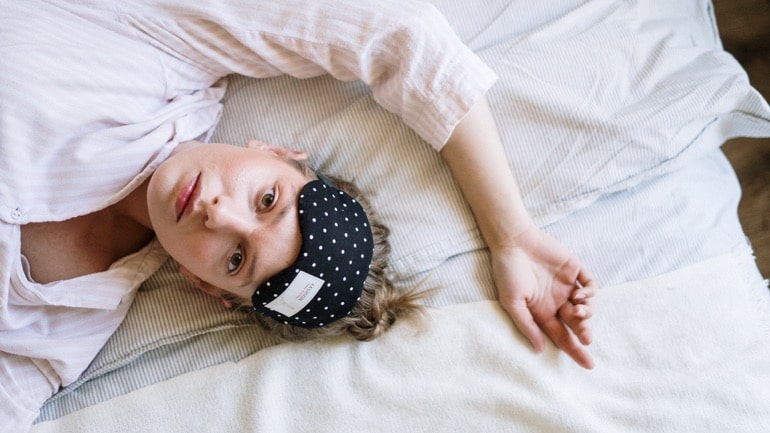
Imagine going to bed joyfully fatigued. You comfortably hug your pillow as you leave the day behind. And then you rest, calmly and refreshingly. Sound familiar? Unfortunately, such a scenario is less likely to happen if you have anxiety and sleep issues. Or maybe it was just a hard night?
Well, hard nights come and go—the problem is when they stick with us. Sleep deprivation can cause us to feel irritated and chronically tired.
Up to 18% of healthy adults have chronic insomnia, and 31.2% of adult Americans experience symptoms of anxiety. As it happens, these two are interrelated by more than just numbers. We set out to examine this connection and establish causality. As we dove deep into the research, certain patterns emerged. Read on, and see what we’ve concluded.
Anxiety and Sleep Problems
We’re aiming to break the stigma of anxiety as a terrible psychiatric disorder. Not to overstate, but this condition is rapidly becoming a constant companion in the modern world. However, with the right help, there are ways to keep it from holding you back.
In terms of symptom severity, serious types of anxiety are classified within the DSM-5 psychiatric criteria. On the other hand, the quieter forms of anxiety may be virtually undetectable. In fact, these underlying symptoms often cause both physical and behavioral issues that fail to be diagnosed, thus undermining one’s quality of life.
Regardless of the severity of symptoms, the relationship between anxiety and sleep deprivation is ever-present. To understand its complexity, we need to further discuss both disorders.
Symptoms of Anxiety
Although commonly referred to as the “augmented sense of fear,” anxiety is experienced through a convoluted mixture of physical and psychological experiences. According to the evidence, the following includes the most common signs and symptoms of anxiety:
- Excessive worrying
- Nervousness, agitation, and restlessness
- Muscle tension
- Constant fatigue
- Restless sleep
- Sense of impending danger
- Trouble concentrating
- Increased heart and breathing rates, often with sweating
- Gastrointestinal problems
- Avoidance of social situations
- Phobia
A study from 2012, which described the connection between the lack of sleep and anxiety, stated that as much as 45.5% of people with diagnosed anxiety disorder have chronic sleep problems.
What’s more, up to 33.7% of the population has some form of anxiety. An interesting fact is that the prevalence deteriorates with aging. Namely, only 15.3% of those older than 60 have symptoms, regardless of the additional pathology. On the other hand, more than 35% of those younger than 60 have an anxiety diagnosis.
Causes of Anxiety
Anxiety can be conditioned with other illnesses, such as depression, heart attack, or mood disorders.
However, the most common external causes are the following:
- Stress
- Existential crisis
- Emotional trauma
- Illicit drug use
- Side effects of medications
Further reading on sleep deprivation and anxiety reveals that they are both stress-related.
Causes of Insomnia
Failing to catch a good night’s rest can be burdensome. According to the research, the usual causes of insomnia are these:
- Stress caused by existential crises
- External irritating factors, such as noise, excessive lighting, or an uncomfortable room temperature
- Sudden changes in sleeping habits (jet lag or work-related)
- Mental health issues, such as depression or anxiety
- Chronic pain
- Excessive use of stimulants, such as coffee, tobacco, or alcohol
- Other sleep disorders, such as sleep apnea or restless legs syndrome
Known Sleep Deprivation Effects
As it happens, the consequences of insomnia introduce yet another relationship between sleep and anxiety.
In otherwise healthy people, the lack of sleep can cause more than just the need for an extra cup of coffee. According to scientific evidence, long-term insomnia causes several physical and mental problems:
- Impairments in physical functions (movement and coordination)
- Extended pain
- Changes in general health perceptions
- A decrease in vitality and fatigue
- Problems in social functioning
- Emotional problems
- Mental health concerns, such as depression and anxiety
The reviewed evidence reveals the bifunctional relationship between sleep-deprivation and the occurrence of mental health issues.
Anxiety and Sleep: Which Comes First?
As shown, both disorders are caused by stress. Additionally, trouble sleeping can be a leading symptom of an anxiety disorder, while anxiety remains one of the better-known sleep deprivation symptoms. To put it simply, both conditions can be caused by the same thing, and each can cause the other to occur.
Anxiety Disorders and Sleep
For more than two decades, scientists have tried to determine the diagnostic separation of anxiety and sleep disorders. Prominent authors state that changes in sleeping patterns dominantly feature in three major anxiety disorders.
Post-traumatic stress disorder (PTSD) is associated with trouble initiating and maintaining sleep and is often followed by nightmares with trauma-related content.
Insomnia is also one of the main symptoms of generalized anxiety disorder (GAD).
However, in panic disorders (PDs), trouble maintaining quality sleep is the main issue, as it’s associated with frequent sleep-induced panic attacks. These instant episodes of anxiety at night are also known as nocturnal panic attacks, which last only a few seconds but can keep the person from falling asleep again, thus fueling the progression of chronic insomnia.
These severe cases of anxiety are often related to other mental health problems, such as depression or mood changes. In other cases, anxiety disorders can be caused by psychological trauma.
Additional studies concur with the statement that, in the case of anxiety disorders, insomnia is a symptom. Therefore, treatment aims at relieving the causes of anxiety with behavioral therapy and by alleviating agitation, sometimes by the use of sleep meditation for anxiety and depression.
Sleep Anxiety
Reliable sources define this as a form of anxiety related to sleep itself. It’s also referred to as “the sleeping dread” and is associated with tossing and turning all night long, without the relief of sleep.
After a longer sleepless period, the known sleep deprivation effects only amplify worry about falling asleep. Consistent irritation grows as stress and anxiety take a firmer hold. This type of anxious behavior is described as a type of performance anxiety and can progress into a more severe state of sleep phobia. In this case, sleep deprivation is a cause.
Sleep anxiety treatment usually includes mild sedatives, which will aid sleep and restfully alleviate anxiety symptoms.
Sleep Paralysis
This condition is best described as an episode of wakefulness with the inability to speak or move. It’s a traumatizing experience often associated with hallucinations and the sense of an external or internal presence.
The causes of this condition are unknown. Recent studies indicate that 8% of the population experiences it. It’s presumed that the main cause of sleep paralysis is shifting sleeping patterns within the brain, induced by various external stimuli. Although regarded as not life-threatening, it often causes anxiety.
The treatment of sleep paralysis and anxiety is based on two different approaches. In order to avoid the alteration of sleep patterns, patients are advised to undertake a full sleep hygiene regime. On the other hand, anxiety must be treated with medication, according to the intensity of the symptoms.
Mild Sleep-Related Anxiety
Also known as underlying anxiety, this is the most common mental health condition related to sleep. The majority of the population lives in this enchanting cycle of mutual sleep-anxiety incitement without even knowing it. In this case, both the symptoms of anxiety and lack of sleep increase over time and are stress-induced.
Existential crises burden us all the time. An overextended state of worrying actually increases stress-hormone levels over time and alters our sleeping patterns. As time progresses, sleep deprivation fuels the anxiety until both become unstable.
According to the research, eradicating one condition is harder to achieve without treating the other. Therefore, a combined approach is best, and it consists of applying good sleep hygiene practices, stress-relief actions, and the use of proper medication.
Sleep Apnea and Anxiety
When breathing is obstructed and ceases during sleep apnea (usually briefly), it disrupts the regenerative processes in the brain. Over time, this increases the levels of stress hormones in the body and often leads to depression. An anxiety episode usually follows.
The time it takes to treat sleep apnea can be problematic for anxiety. Put simply, although there are several approaches available, successful treatment might take a long time. And during this period, mental health symptoms are usually exacerbated.
In this particular case, prescription sleeping pills are out of the question. Therefore, most treatments can only rely on the use of vitamins for sleep and anxiety.
Separation Anxiety
This condition is induced by separation-related trauma, but it’s also genetically conditioned and more common in certain personality types. It affects all ages, ranging from toddlers to fully developed individuals and is estimated to affect 4% of children 7–11 years of age, as well as 6.6% of adults.
As the anxiety progresses, the sleep deprivation symptoms become more prominent. Researchers conclude that in this case, the insomnia symptoms are directly proportional to the anxiety symptoms. This also means that the treatments and outcomes can be monitored comparably.
Infants always experience separation anxiety, and sleep training still remains the best way to treat this type of condition. However, some form of this anxiety may endure and develop further, which can worsen in later years.
In adults, separation anxiety is seldom treated with drugs—the most effective way to deal with it is cognitive-behavioral therapy. In the case of an accompanying sleep disorder, mild sedatives are prescribed for the initial period, until the psychological issues are resolved. Natural remedies are only used in cases of anxiety-induced occasional sleeplessness.
Treatments for Anxiety and Sleep
Fortunately, both anxiety and insomnia are treatable. The best strategy for achieving an optimal therapeutic outcome is to determine which condition developed first and treat it.
Both the known sleep deprivation symptoms and causes of anxiety can be treated with medication, as well as non-pharmaceutically. However, in some cases, a combined approach might be the best possible option.
Anxiety and Sleep Medication
Medically, both conditions are associated with hyperexcitation. In other words, stress hormones and other neurotransmitters tend to overreact within the brain, thus increasing the overall level of awakeness and neuromuscular tension.
The best pharmacological strategy includes the use of medication that targets specific brain structures and inhibits overwhelming excitation. The effects these drugs aim for are as follows:
- Sedative effects, also referred to as tranquilizing, or anxiolytic
- Muscle relaxation, which relieves tension, lowers blood pressure, and provides physical relief
- Sleep-inducing (hypnotic) effects
Determining which is the best sleep and anxiety medication depends on the type of condition, the drug’s potency, and its safety profile.
Prescription Medication
Severe forms of anxiety disorders are treated with potent medication that both induces sleep and offers tranquility. Commonly prescribed drugs are the following:
- Benzodiazepines offer sedation and muscle relaxation. These are clonazepam, diazepam, alprazolam, and lorazepam. They are very effective but should be taken with precaution because they carry high risks of tolerance, abuse, and dependency.
- Non-benzodiazepine hypnotics are the best option for severe insomnia, as they induce deep sleep. These are zolpidem, zaleplon, and eszopiclone.
- The antidepressants that help with sleep and anxiety are escitalopram, sertraline, amitriptyline, and paroxetine. They rebalance neural chemistry and eliminate constant overstressing. However, it might take longer for them to fully express their effects.
- Beta-blockers, such as propranolol, are used in treating other organic manifestations of anxiety.
Prescription meds are used in sleep-related anxiety disorders, such as GAD, PTSD, and PA. In complicated cases, the concomitant use of benzodiazepines and antidepressants is mandatory.
Sedatives are also used for sleep-anxiety cyclic disturbances. Hypnotics are the best choice for insomnia-induced conditions, such as sleep paralysis and sleep anxiety. They’re introduced to re-establish sleep patterns and to maintain sleep quality.
OTC Drugs
Over-the-counter drugs for anxiety and sleep disorders are mild hypnotics, used for mild to moderate insomnia. These are antihistamines, such as diphenhydramine, and can be a good choice for occasional insomnia-induced anxiety.
Natural Remedies
The pharmacy offers a spread of natural-labeled sleep remedies. However, not all of these are appropriate for stress- and anxiety-induced sleep deprivation symptoms.
The best choice of natural sleep aid is also determined by the condition. As mentioned before, sleep paralysis accompanied by anxiety is best treated by prescription meds. On the other hand, there’s evidence that natural remedies can fight off most underlying, milder conditions.
Herbs for Anxiety and Sleep
You can find a selection of natural remedies in your backyard. However, this doesn’t mean that they all satisfy the criteria for treating restless sleep.
Here are the most effective herbs that offer tranquillity:
- Valerian
- Lemon balm
- Hops
- Passionflower
- Lavender
- Chamomile
- Cannabis
- Magnolia
- California poppy
- Kava
Given their varying chemical compositions, it’s hard to quantify the efficacy of each herb. Therefore, standardized extracts are used to offer a greater therapeutic magnitude.
Valerian root, lemon balm, and hops are the most common composite anxiolytic mixtures, whose effects can be found in the beneficial essential oils for sleep and anxiety that they produce. Nevertheless, they have many pharmaceutical forms, such as tinctures, capsules, tablets, and even ointments.
The use of herbs is recommended in mild cases of sleep-induced anxiety, as they provide smooth neural destimulation and grant natural sleep. However, in the cases of more dominant anxiety symptoms, these herbs are enhanced by other compounds, such as the sleep hormone melatonin and neuro-stabilizing amino acids.
The best sleep supplements often contain powerful combinations that act both on anxiety symptoms and induce deep sleep.
Magnesium for Sleep and Anxiety
It’s a known fact that this mineral plays an important role in more than 300 biochemical reactions in the body. Although inherently ineffective in treating the causes of insomnia, magnesium is a very useful mineral in treating its symptoms, such as stress or physical tension.
Magnesium soothes skeletal muscles and promotes nerve relaxation. Therefore, it’s an excellent choice for relieving tension and preventing anxiety symptoms. Furthermore, magnesium aids the effects of other benzodiazepine-like herbs, and it’s a complementary ingredient in complex supplements.
The Use of CBD Oil for Sleep and Anxiety
The scientific community is researching cannabis more than ever. In the last decade, copious amounts of evidence have emerged testifying in favor of using cannabidiol for sleep.
According to the evidence, CBD oil has powerful anxiolytic and sleep-maintaining properties. Additionally, CBD oil aids immune function, helps relieve chronic pain, and has neural disinhibiting effects.
There are various CBD-laced products on the market today in terms of potency, dosing, and the duration of effects. Choosing the best CBD product depends on the severity of the symptoms. In cases of sleep paralysis and sleep anxiety, a combination of CBD and melatonin could provide optimal results.
In general, the use of cannabis and its essential oil for sleep and anxiety has been documented for centuries. Now, as science urges us to procure the evidence for these unprecedented beneficial effects, we can only expect to soon see cannabis-infused products on our pharmacy’s shelves.
Sleep Hygiene
Accumulated stress is a leading cause of both conditions. In the case of sleep-induced anxiety, one of the primary ways to maintain healthy sleeping habits is to remove the stressors.
This is best achieved through a set of useful practices that we call sleep hygiene. Sleep hygiene implies natural techniques and is often confused with sleep hypnosis for anxiety and depression.
Advice for adopting good sleep habits:
- Determine how much sleep you need
- Keep regular sleep hours
- Sleep in a quiet, dark, and cool place
- Limit the use of electronic devices
- Watch what you eat and drink in the evening
- Limit daytime napping
- Eliminate the use of stimulants
- Exercise
- Keep a sleep diary
Create an unwinding routine to help you relax and focus your mind. A warm bath before bedtime relaxes the senses and peripheral muscles, and reading a book or listening to soothing music can distract your thoughts and ease falling asleep. Furthermore, practicing mindful meditation for sleep and anxiety has been proven effective in treating short-term insomnia in adults.
Conversely, sleep hypnosis is a technique that uses external stimulation, such as guided voice or visuals, to target the subconscious to overcome feelings of anxiety. Some researchers suggest that, if used extensively, hypnosis can rebound and even worsen the sleep outcome.
Psychotherapy
Psychotherapy is considered one of the most effective approaches to treating mental illnesses. However, there are many forms of therapy and not all seem to successfully detangle the relationship between anxiety and sleep.
According to the research, modular psychotherapy could help improve anxiety-related insomnia in the elderly in primary care settings. However, the most efficient approach to date remains cognitive behavioral therapy (CBT).
Recent studies reveal that CBT effectively relieves symptoms of sleep anxiety and reduces the frequency of nocturnal panic attacks. However, the results are perceived over the long term; meanwhile, medication remains the best short-term option.
FAQs
How can I stop sleep anxiety?
Sleep anxiety is often referred to as fear of the inability to fall asleep. It’s defined by worrying about falling asleep and is associated with performance anxiety. Also known as the “sleeping dread,” this condition is usually treated with sedatives and the appropriate sleep hygiene techniques.
How do stress and anxiety affect sleep?
Stress can cause both sleeplessness and anxiety. Accumulated stress impacts the neurochemistry of the brain to produce significant amounts of stress hormones, which in time alter sleeping patterns. This causes the most common symptoms of insomnia, such as fatigue, low concentration, and trouble fully interacting with the community. Repeated episodes of stress-induced sleep deprivation induce a chronic state of anxiety, which further devastates quality sleep.
Is insomnia common with anxiety?
About 45.5% of people with diagnosed anxiety disorder have sleeping problems. Sleep deprivation is most prevalent in generalized anxiety disorder (GAD) and post-traumatic stress disorder (PTSD). On the other hand, insomnia can be the cause of anxiety, such as in sleep anxiety or sleep paralysis.
Can anxiety wake you up from sleep?
Anxiety (panic) attacks can affect people during the day, as well as at night. The latter is referred to as nocturnal panic attacks. They can last only a few seconds but usually prevent the person from falling asleep again. Panic attacks are treated with a combination of behavioral therapy and anxiolytics.
Do sleeping pills help with anxiety?
Prescription sleeping pills are hypnotic-sedatives, which means they both tranquilize and induce sleep. In less severe cases, mild sedatives are used, but only to affect anxiety, thus allowing natural rest to occur.
Wrapping Up
Anxiety and insomnia are intrinsically connected. They are both stress-related, and each can cause the other to occur.
Defining the type of anxiety is the best way to approach treatment. The first step is to recognize the stressors around you and do a self-check for any of the symptoms. If you’re packing even an inch of anxiety in your bag, it’s likely that’s what’s keeping you up at night. Natural remedies will give you a quick fix, but behavioral therapy is better in the long run.
The bottom line is knowing that anxiety and sleep have a deep, mutually reflective relationship that we are capable of treating.

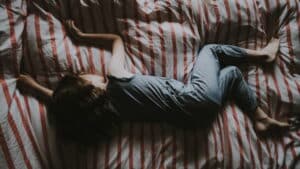
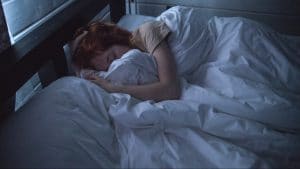

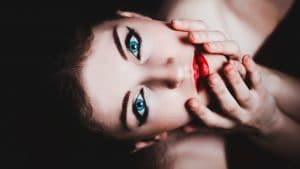
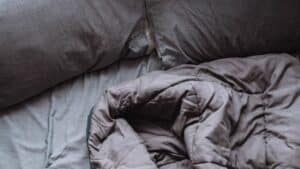

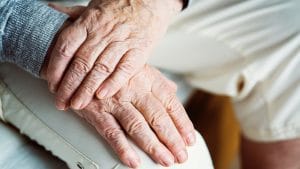
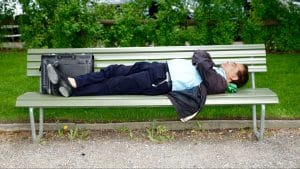
Warning: Undefined array key "format" in /home/602518.cloudwaysapps.com/cspedpjass/public_html/wp-content/themes/disturbmenot/template-parts/post-item/post-comment.php on line 23
Warning: Undefined variable $commenter in /home/602518.cloudwaysapps.com/cspedpjass/public_html/wp-content/themes/disturbmenot/template-parts/post-item/post-comment.php on line 27
Warning: Trying to access array offset on value of type null in /home/602518.cloudwaysapps.com/cspedpjass/public_html/wp-content/themes/disturbmenot/template-parts/post-item/post-comment.php on line 27
Warning: Undefined variable $commenter in /home/602518.cloudwaysapps.com/cspedpjass/public_html/wp-content/themes/disturbmenot/template-parts/post-item/post-comment.php on line 29
Warning: Trying to access array offset on value of type null in /home/602518.cloudwaysapps.com/cspedpjass/public_html/wp-content/themes/disturbmenot/template-parts/post-item/post-comment.php on line 29